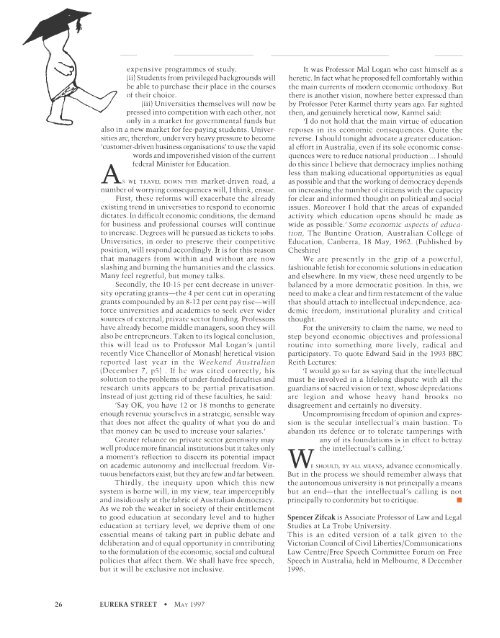n - Eureka Street
n - Eureka Street
n - Eureka Street
You also want an ePaper? Increase the reach of your titles
YUMPU automatically turns print PDFs into web optimized ePapers that Google loves.
expensive programmes of study.(ii) Students from privileged backgrounds willbe able to purchase their place in the coursesof their choice.(iii) Universities themselves will now bepressed into competition with each other, notonly in a market for governmental funds butalso in a new market for fee-paying students. Universitiesare, therefore, under very heavy pressure to become'customer-driven business organisations' to use the vapidwords and impoverished vision of the currentfederal Minister for Education.AS WE TRAVEL DOWN THIS market-driven road, anumber of worrying consequences will, I think, ensue.First, these reforms will exacerbate the alreadyexisting trend in universities to respond to economicdictates. In difficult economic conditions, the demandfor business and professional courses will continueto increase. Degrees will be pursued as tickets to jobs.Universities, in order to preserve their competitiveposition, will respond accordingly. It is for this reasonthat managers from within and without are nowslashing and burning the humanities and the classics.Many feel regretful, but money talks.Secondly, the 10-15 per cent decrease in universityoperating grants-the 4 per cent cut in operatinggrants compounded by an 8- 12 per cent pay rise-willforce universities and academics to seek ever widersources of external, private sector funding. Professorshave already becom e middle managers, soon they willalso be entrepreneurs. Taken to its logical conclusion,this will lead us to Professor Mal Logan's (untilrecently Vice Chancellor of Monash) heretical visionreported last year in the Weekend Australian(December 7, pS) . If h e was cited correctly, hissolution to the problems of under-funded faculties andresearch units appears to be partial privatisation.Instead of just getting rid of these faculties, he said:'Say OK, you have 12 or 18 months to generateenough revenue yourselves in a strategic, sensible waythat does not affect the quality of what you do andthat money can be used to increase your salaries.'Greater reliance on private sector generosity maywell produce more financial institutions but it takes onlya moment's refl ection to discern its potential impacton academic autonomy and intellectual freedom. Virtuousbenefactors exist, but they are few and far between.Thirdly, the inequity upon which this newsystem is borne will, in my view, tear imperceptiblyand insidiously at the fabric of Australian democracy.As we rob the weaker in society of their entitlementto good education at secondary level and to highereducation at tertiary level, w e deprive them of oneessential m eans of taking part in public debate anddeliberation and of equal opportunity in contributingto the formulation of the economic, social and culturalpolicies that affect them . We shall have free speech,but it will be exclusive not inclusive.It was Professor Mal Logan who cast himself as aheretic. In fact what he proposed fell comfortably withinthe main currents of modem economic orthodoxy. Butthere is another vision, nowhere better expressed thanby Professor Peter Karmel thirty years ago. Far sightedthen, and genuinely heretical now, Kannel said:'I do not hold that the main virtue of educationreposes in its economic consequences. Quite thereverse. I should tonight advocate a greater educationaleffort in Australia, even if its sole economic consequenceswere to reduce national production ... I shoulddo this since I believe that democracy implies nothingless than making educational opportunities as equalas possible and that the working of democracy dependson increasing the number of citizens with the capacityfor clear and informed thought on political and socialissues. Moreover I hold that the areas of expandedactivity which education opens should be m ade aswide as possible.' Some economic aspects of education,The Buntine Oration, Australian College ofEducation, Canberra, 18 May, 1962. (Publish ed byCheshire)We are presently in the grip of a powerful,fashionable fetish for economic solutions in educationand elsewhere. In my view, these need urgently to bebalanced by a more democratic position. In this, weneed to make a clear and firm restatement of the valuethat should attach to intellectual independence, academicfreedom, institutional plurality and criticalthought.For the university to claim the nam e, we need tostep beyond economic objectives and professionalroutine into som ething more lively, radical andparticipatory. To quote Edward Said in the 1993 BBCReith Lectures:'I would go so far as saying that the intellectualmust be involved in a lifelong dispute with all theguardians of sacred vision or text, whose depredationsare legion and whose heavy h and brooks nodisagreem ent and certainly no diversity.Uncompromising freedom of opinion and expressionis the secular intellectual's main bastion. Toabandon its defen ce or to tolerate tamperings withany of its foundations is in effect to betraywthe intellectual's calling.'SHOULD, BY ALL MEANS, advance economically.But in the process we should remember always thatthe autonomous university is not principally a meansbut an end- that the intellectual's calling is notprincipally to conformity but to critique.•Spencer Zifcak is Associate Professor of Law and LegalStudies at LaTrobe University.This is an edited version of a talk given to theVictorian Council of Civil Liberties/CommunicationsLaw Centre/Free Speech Committee Forum on FreeSpeech in Australia, held in Melbourne, 8 December1996.26EUREKA STREET • MAY 1997
















